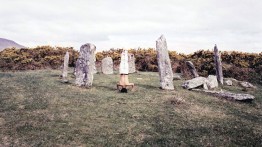Human Measure in Contemporary Art
Tuesday, November 18, 2014, 7 - 8:30pm

Mein Warten auf Veränderung II (Me Waiting for Change II). 2001. Antonio Paucar
The Interdisciplinary Seminar presents a free, public lecture by the art historian and critic Doris von Drathen. Born in Hamburg, Germany and based in Paris since 1990, she has held teaching positions at the École des hautes Études in Paris, the Rijksakademie in Amsterdam, the Architectural Association School of Architecture in London, and at Cornell University, New York State. She continues to lecture at Columbia University and teaches at the École Spéciale d´Architecture in Paris since 2007.
Known for her transversal approach, Doris von Drathen has published in: Vortex of Silence – Proposition for an Art Criticism Beyond Aesthetic Categories, 2004; Rebecca Horn – Sculptures, 2005 and Drawings, 2006; Pat Steir – Installations, 2006 and Paintings, 2007; Rui Chafes, 2008; Rebecca Horn – Cosmic Maps, 2008; Manuela Filiaci, 2009; Rebecca Horn and Jannis Kounellis, 2009, Nalini Malani, 2010, and Painting Space – Fabienne Verdier, 2012; Place by Place – Felice Varini, 2013. Monographs on Kimsooja and Yannis Kounellis are forthcoming, as is the publication of her research on “Space of the Other” (working title).
Doris von Drathen appears as part of the Interdisciplinary Seminar, created as a discussion series on artistic practice for the students of the Cooper Union School of Art and the creative community that surrounds them. Lectures are free and open to the public.
Located in the Frederick P. Rose Auditorium, at 41 Cooper Square (on Third Avenue between 6th and 7th Streets)




